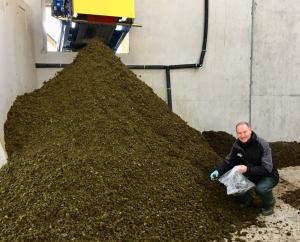AFBI leading on managing nutrients from slurry
Date published:
The Nutrient Management Centre at the Agri-Food and Biosciences Institute (AFBI), Hillsborough, funded by the Department of Agriculture, Environment and Rural Affairs (DAERA) is currently being commissioned with a key goal to explore technologies which offer opportunities for better nutrient management of slurry and digestate.

Screw Press Separation and Centrifugation are the two established technologies currently being investigated for their impact and effectiveness in removing, off farm, large quantities of solids from farm slurries and digestates i.e. feedstock. Separation of feedstock produces a solids fraction containing a high proportion of phosphorus (P) which is more economical to transport off farm for both agricultural and non-agricultural purposes. This is especially important for Northern Ireland, since oversupply of P to grassland has increased soil P levels beyond crop requirement optimum, leading to increased risk of P runoff to water courses and a negative impact on water quality.

Use of centrifugation should result in even higher levels of P removal, with potential for >60% of P being removed in the solid fraction. Therefore, the technology appears to have appreciable potential to address the challenge of better management and recycling of the nutrients in slurry and digestate, contributing to more effective nutrient management and reduced environmental impact.